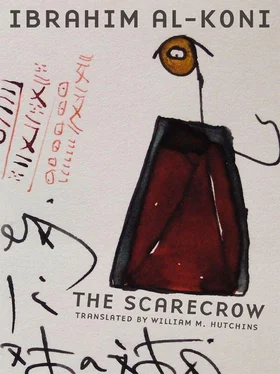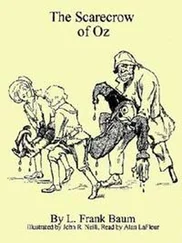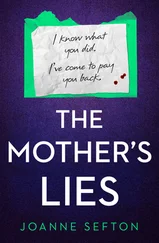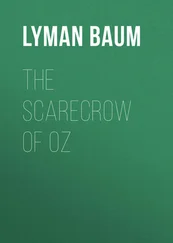Astonished, Tayetti retreated, and men rushed to fetch water. It was said that the hero calmed down and collapsed once people had poured two skins of water over his head, but the poor slave had been strangled by his grip.
1
It is related that the hero — once he was liberated from possession by the jinn — retreated to a corner of his house and wept for his dead slave there for days. The herbalist came to treat his bloody eyes, which he had almost plucked out during his temporary insanity on that ill-omened day. He found his patient swaying side to side like a person in an ecstatic trance. His veil was dangling down, revealing the lower half of his face. From his chest rose a muffled, painful wail, and with his fist he was pounding a monotonous beat on the house floor — which was covered with skins — as if keeping time to an unknown tune no one else could hear.
The herbalist hovered around him for a time and then knelt nearby. He flung his supplies on the mat and stretched out a lean, dark hand marked with veins, creases, and old scratches, to examine the bloody eyes — even though his feverish patient never stopped pounding the hide with his mysterious beats, which he paired with a vague dance and an inaudible tune.
When he loosened the bandage wrapping the eyes, he found that the linen had adhered to the eyelids as the blood dried. Then he, too, began to sway back and forth, as if mimicking the hero, and released a long, barely audible moan. He plunged his fingers into a container filled with a dark, viscous liquid and began to anoint his patient’s eyes. He continued to moan his mysterious song till he finished freeing the scrap of cloth from the dried blood. He pulled the cloth away, and then the damage to the eyes was obvious. They were bloody and swollen, as if a wild beast’s fangs had ravaged them.
The herbalist scooted back and sighed deeply. He remarked like a diviner repeating a prophecy: “When a herbalist is perplexed about the cure, a patient is left with the choice between a sorcerer or a diviner.”
He dipped a piece of black linen in another container, which was filled with a green liquid, and began to massage his patient’s eyes with that. He added, “It doesn’t harm the herbalist to acknowledge his inability to effect a cure when he sees that the malady resisting him isn’t — like ordinary diseases — an enemy spawned by the wasteland, but a messenger from the Spirit World.”
He tossed the rag aside and drew a leather pouch from his satchel. He untied its ribbon very slowly and sprinkled dark powder into his palm. Then he spread this suspect dust around the eyes, and the maniac responded for the first time by ceasing his muffled moaning, even though his fist continued to pound the mat with the same beat.
“I haven’t concealed anything from my master. I shared my doubts with him about the affliction the first day.”
The feverish hero resumed his moaning, swaying, and drumming.
The herbalist soaked another piece of cloth in a liquid from another container and then wrapped the cloth around the invalid’s head.
He started to bandage the eyes carefully and remarked in the same enigmatic tone, “I wasn’t stingy with advice for my master yesterday. I haven’t been stingy with advice for my master today. My master would do himself a favor if he went to the diviner or sorcerer today, not tomorrow. The stubbornness of heroes, master, is useless in combatting diseases from the Spirit World.”
He emitted a long, heartrending groan, and tears formed in his eyes. He traveled far away — the way lovers, hermits, wayfarers, poets, and ecstatics do. He hummed as if singing a stanza of poetry from an ancient epic.
“Physical pains afflicted man one day, and the herbalist arrived in the desert. Secret pains afflicted man one day, and the herbalist couldn’t find a cure for them in the desert’s herbs. So man was about to go extinct. Then the spiritual worlds collaborated and sent the sorcerer to the wasteland. When man was afflicted by other, even more mysterious diseases, and was threatened by annihilation once more, the Spirit World intervened and man found that the soothsayer had settled in the wasteland — as if he had sprouted from the belly of the dirt like grass or truffles or had fallen from the sky like rain or specters of jinn.”
2
He went to visit the female diviner.
She appeared and sat with him in the Chamber of Sacrificial Offerings.
She said with a diviner’s tongue: “The pains of heroes are the calamity of hypochondriacs.”
“And the sympathy of noblemen is the calamity of heroes.”
“I thought that the sympathy of the nobles was always a balsam.”
“A balsam for the masses and for foreigners but a fatal blow to the hearts of the elite men commoners refer to as heroes.”
“Are you sure about this or do you merely suspect it?”
“Actually, this is the normal course of events, my lady. We have typically grown accustomed to finding people gloating whenever calamities strike our homes.”
“Enemies’ gloating for the judicious man today is a treasure that will help him on the morrow.”
“The matter would be easy, my lady, if this gloating was that of enemies. The gloating of boon companions, my lady, leaves an aftertaste in the throat bitterer than colocynth.”
“But this is also the Law of things.”
“You’re right, but I don’t know why we acknowledge all the laws, accepting even the harshest of them, and yet disparage the Law that makes yesterday’s boon companion the first to deliver a blow when calamity strikes.”
“This is the wisdom of the Spirit World.”
“But this is a cruel wisdom, my lady; it is a wisdom crueler than any other.”
“The Spirit World does not offer us its wisdom gratis. The Spirit World has given it to us on the understanding that we will pay the full retail price.”
“But that’s the cruelest possible price.”
“We should trust no one.”
“Tribes customarily teach this lesson to their children without understanding it.”
“The phrase is brief, as you observed, but exposes our life to danger if we understand it too late.”
“I don’t understand wisdom’s utility when understanding it too late is a precondition for it.”
“True wisdom is only understood after it is too late.”
“This is what’s worst about the matter. This is what’s worst about wisdom.”
“But let’s drop the question of wisdom and search for the cure.”
“The truth is that my only reason for approaching the sanctuary has been to search for a cure.”
“My tongue may possibly reveal something that embarrasses me.”
“I will give my lady everything I possess if my lady will show me the sun’s disc.”
“My tongue may possibly reveal something that embarrasses me.”
“I will give my lady everything. I will give her even the title ‘hero,’ which became part of me, if my lady can show me the sun for a single day, a single hour, or a single instant.”
“My tongue may possibly reveal something that embarrasses me.”
3
“In the urine of a woman who has known only her husband is found the cure.”
The prophecy was inscribed on soft gazelle-skin parchment wrapped in a piece of faded linen and fastened with straps of colored leather. Her messenger brought it at twilight. He said his mistress refused to accept any fee for this prophecy until the cure was effected.
“In the urine of a woman who has known only her husband is found the cure.”
What correlation does the Spirit World see between women’s liquids and sorceries that blind the eye? Why does prophecy keep surprising us with one marvel after another? Or — does the secret of prophecy rest in its marvelous quality? Would prophecy lose its magic if marvel were not its mate?
Читать дальше












